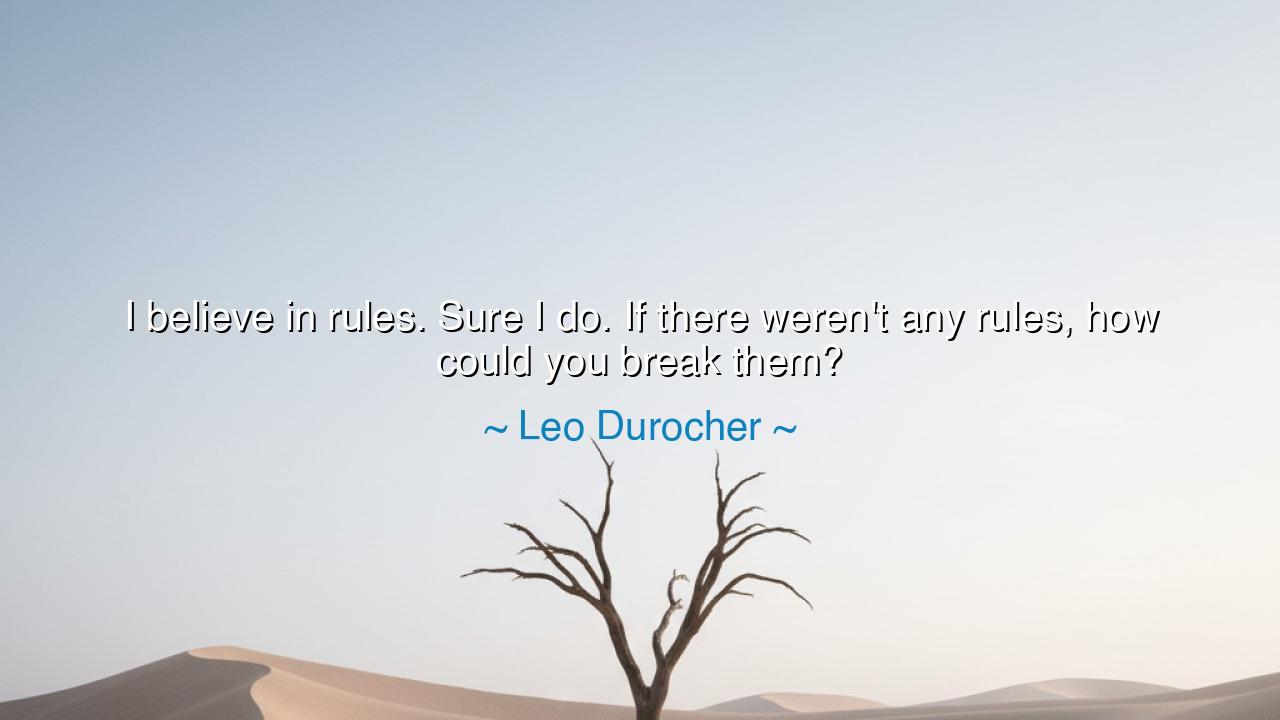
I believe in rules. Sure I do. If there weren't any rules, how






In the world of athletics, where discipline, structure, and the pursuit of excellence often reign supreme, there came a man whose words would echo beyond the diamond and into the hearts of all those who dared to challenge the status quo. Leo Durocher, a name synonymous with both greatness and controversy, once said, "I believe in rules. Sure I do. If there weren't any rules, how could you break them?" This seemingly simple quote, spoken in the heat of competition, carries with it a profound truth: that the very foundation of freedom and rebellion is built upon the structure of constraint.
At first glance, it may seem paradoxical to suggest that one must believe in rules in order to break them. After all, does not rebellion stand in opposition to structure? And yet, in the ancient world, those who sought greatness often did so by confronting the established order, by challenging the norms that constrained them. The heroes of old—whether Heracles, Achilles, or Alexander the Great—were not content to simply live within the confines of their world. They sought to push boundaries, but the very acts of defying the rules were made possible by the rules themselves. How could one know what constituted a true transgression without first understanding the framework in which they operated?
Consider the story of Hercules and his legendary twelve labors. These tasks were not merely random acts of strength or courage; they were challenges designed to test the limits of his abilities. Yet, to overcome them, Hercules had to first understand the rules of the world he inhabited—the laws of nature, of justice, and of fate. His rebellion against these constraints, whether it was slaying the Hydra or capturing the Ceryneian Hind, was made possible because he knew the boundaries that had been set before him. The greatness of his deeds was not born from a mindless disregard for rules, but from a conscious decision to transcend them.
In the same way, Leo Durocher’s words ring true for anyone who has ever sought to break free from the ordinary. Whether in sports, art, or life itself, there is power in knowing the rules, understanding them, and then choosing to transcend them. Durocher himself, a legendary figure in baseball, was known for his audacity, for his ability to push the limits of both the game and the rules that governed it. His very style of play—aggressive, daring, and often controversial—was a reflection of his understanding of the rules and his willingness to challenge them. He did not reject the idea of structure but saw it as a canvas upon which to paint his own narrative.
The wisdom of this quote, however, extends beyond the world of sports. It speaks to the universal human experience of striving for greatness. For what is life without boundaries, without guidelines, and without challenges? We might wander aimlessly in a world where nothing is sacred, where every line can be crossed without consequence. But the rules—however frustrating they may seem—give our lives meaning. They provide us with the foundation from which to rise, to build, and to test our limits. To be truly free, we must understand what we are rebelling against. Without rules, there would be no way to measure our victories or our failures.
Consider the great innovators of history, those who reshaped the world with their ideas. Isaac Newton, in his laws of motion and universal gravitation, did not simply reject the constraints of the natural world. Instead, he studied them deeply, and through his understanding of the existing rules, he was able to revolutionize science. His work did not come from a place of ignorance of the rules but from a place of mastery over them. It was his ability to understand the rules that allowed him to move beyond them, to unlock the secrets of the universe.
The lesson here is clear: understand the rules before you seek to break them. To do so is not an act of rebellion for rebellion’s sake, but an act of purposeful defiance, a step towards achieving something greater than the limitations that confine you. The path to greatness does not lie in mindlessly rejecting structure but in having the wisdom to see how it can be transformed, how it can be used as a tool for growth, creation, and freedom.
Let us take this lesson to heart. Do not fear the rules, for they are not your enemies, but your allies in the pursuit of greatness. Understand them, master them, and then, when the time is right, transcend them. As we move forward in our own lives, let us remember that true freedom comes not from the absence of rules but from the ability to shape our own destiny within their framework. And in doing so, we honor not just the structure of our world but the very essence of human spirit—the will to rise above, to challenge, and to create something greater than ourselves.






AAdministratorAdministrator
Welcome, honored guests. Please leave a comment, we will respond soon